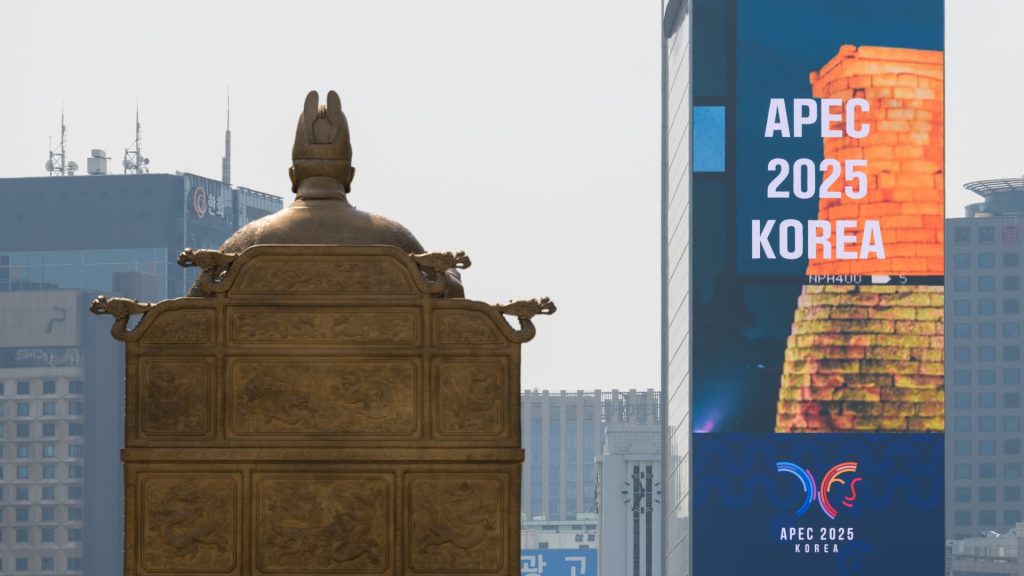SEOUL, SOUTH KOREA – 2025/04/16: An APEC 2025 large-scale promotional video and a statue of King Sejong the Great are seen at Gwanghwamun Square in central Seoul.
Sopa Images | Lightrocket | Getty Images
An intergovernmental grouping of 21 economies including the United States and China warned Thursday that their collective growth risks a sharp slowdown, as tariff tensions and policy uncertainty weigh on investment and trade.
The Asia Pacific Economic Cooperation forecasts growth to drop to 2.6% in 2025, from 3.6% in the prior year.
“From tariff hikes and retaliatory measures to the suspension of trade facilitation procedures and the proliferation of non-tariff barriers, we are witnessing an environment that is not conducive to trade,” said Carlos Kuriyama, Director of the APEC Policy Support Unit, at a meeting in South Korea.
Kuriyama also said that the uncertainty was weighing on business confidence, leading many firms to delay investments and new product launches until the situation turned “more predictable.”
The gathering comes at time when U.S. President Donald Trump’s aggressive trade stance and massive “reciprocal” tariffs have invited retaliatory measures from partners. While the “reciprocal” tariffs have been suspended, the environment remains fraught with uncertainty.
Kuriyama noted that restoring confidence in trade requires not only easing tensions, but also actions such as strengthening supply chain resilience and improving transparency of trade rules and procedures.
Comments from former and current trade officials to CNBC also echoed this view, emphasizing the importance of predictability in global trade.
Former Canadian trade minister Mary Ng told “Squawk Box Asia” that what companies, entrepreneurs, and countries are looking for trade agreements that offer trading partners a certain predictability for doing business with each other.

Ng was trade minister when Trump imposed 25% levies on steel and aluminum — U.S. is Canada’s largest market for steel — and had sought a formal consultation with the U.S. to address tariff-related issues.
“I think that all of us owe it to our economies, to our people, to our businesses, to do our level best, to create the right conditions environments, so that predictability is there, so that the rules are there, so that business can count on that and they can plan on that. That’s what they look to governments to do.”
Malaysian Trade and Investment Minister Tengku Zafrul Aziz, who welcomed the recent de-escalation of trade tensions between the U.S. and China, emphasized on the importance of dialogue between countries.
Malaysia and other ASEAN countries believe in a “rules-based multilateral trading system, he told CNBC.
World Trade Organization Director-General Ngozi Okonjo-Iweala also attended the event and urged that “there should be dialogue with the U.S. to find out why did we get where we are and what can we do about it”
She cautioned about U.S.-China tensions, saying that “if the world breaks up into two global trading blocks, we could lose 7% in global GDP in the longer term.”


